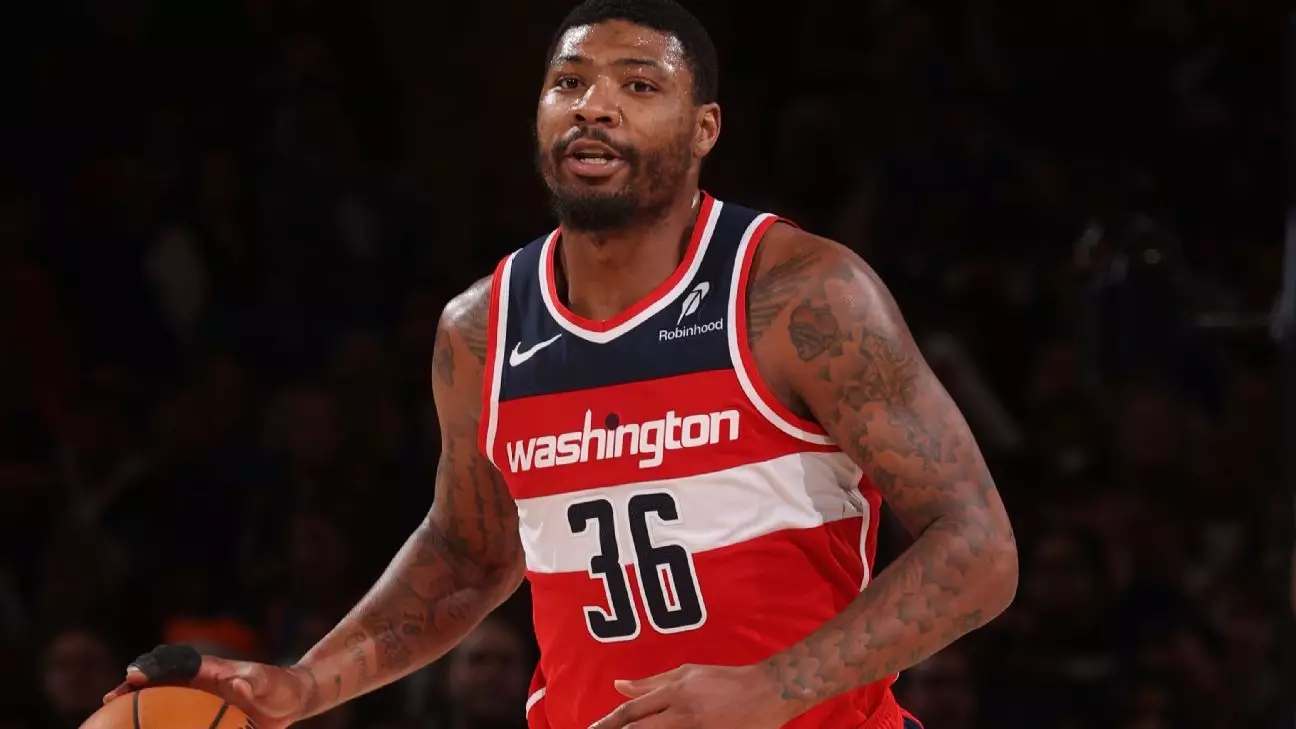The realm of sportsmanship is a fragile balance, teetering on the thin line between passionate fandom and inappropriate behavior. This precarious balance was recently tipped during a game at TD Garden, where former Boston Celtics guard Marcus Smart now of the Washington Wizards found himself embroiled in an unsettling confrontation with a fan. As the Celtics played host to Smart’s new team, the atmosphere should have been one of nostalgia and camaraderie, marking the return of a beloved player. Instead, it devolved into something darker, showcasing just how invasive fandom can become.
Smart’s condemnation of the fan’s actions was glaringly evident. “He just crossed the line,” he stated, reflecting a deep sense of loyalty not just to the game, but to the city and its fan base. But when does support transform into harassment? This incident serves as a reminder that while athletes thrive off the energy of passionate fans, there comes a point when that devotion morphs into something wholly inappropriate. In this case, ‘heckling’ lost its comedic edge and turned into a disrespectful and outright disruptive display, revealing a more toxic side to fan culture that has gone largely unaddressed.
The Complexity of Player-Fan Relationships
To analyze the relationship between players and fans is to delve into a complex psychological landscape. Fans view athletes as extensions of their identities, exalted figures on whom they project their aspirations, disappointments, and sometimes even rage. However, the mindful and mutual respect that should govern this relationship often evaporates in the heat of competition.
Marcus Smart’s detour into the fan’s aggression epitomizes the risk of emotional investment gone awry. While it’s natural for fans to celebrate their teams, there comes a point when this inner fervor drips into entitlement and violation of an individual’s personal space. Smart’s assertion that he does not tolerate “line crossing” hits home—not just as a mantra for personal dignity, but as a call for fans to reflect on their behaviors and motivations. Does the thrill of competition justify abusive comments or personal attacks? The answer should undoubtedly be a resounding no.
The Emotional Journey of Athletes
For many seasoned athletes, their connection to a city transcends mere professional obligation; it symbolizes an ancestral bond built through years of sweat and perseverance. Smart’s recollections of emotional ties to Boston illustrate the depth of this connection—beyond basketball, there are friendships forged in shared struggles and personal tragedies. When he reflects on his former teammates attending his mother’s funeral, one cannot help but feel the weight of his sentiments. This isn’t just about basketball; it’s about life, love, and loss.
Furthermore, as Smart returned to Boston for the first time since his trade to the Wizards, the emotional complexity must have flooded in waves. Fans chanted “We want Marcus!” which serves as a beautiful testament to his impact in the city. Yet, amid the nostalgia, he faced the acute realization that once you are in the NBA spotlight, your life becomes a public affair. The juxtaposition of love and scrutiny reveals an uncomfortable truth—while fans can foster a sense of belonging, they can just as easily infringe upon the very essence of personal identity.
The Bigger Picture: Addressing Toxic Fan Culture
As Marcus Smart experiences this tumultuous return from a professional and personal standpoint, it is vital for the sports community to engage in open conversations concerning fan behavior. While passionate support is a cornerstone of sports, society must cultivate a culture where boundaries are respected, and harassment is unequivocally condemned. Fan engagement should be an uplifting experience, not a battleground for personal attacks dressed in the guise of rivalry.
It’s high time for teams and leagues to take a stand against toxic fandom. Initiatives aimed at educating fans about respectful engagement could make a significant impact. As the NBA and other sports organizations look to the future, they must prioritize mental health and emotional wellness, not just for players but for fans as well. Understanding that sports are a shared experience should ground fandom in camaraderie over conflict, compassion over chaos.
This recent altercation at TD Garden stands as a cautionary tale, a stark reminder that respect is paramount. Marcus Smart once again finds himself at the intersection of these complex emotional narratives, forcing all of us to reconsider our roles as observers, participants, and, ultimately, human beings within this beautiful, agonizing world of sports.


Leave a Reply